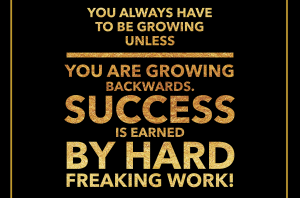
I’m Tired Of Our Obsession With Self-Achievement-Centered Success.
Success With A Capital ‘S’
We live in a society obsessed with Success.
There’s no doubt about it. You can look around online or even in a bookstore, and you will easily find an endless array of publications with titles like “How to Become Successful Quickly” or “10 Steps To Becoming Successful” or “The Key To Becoming Successful”, and so forth, ad nauseum. Business magazines have articles on becoming successful. Tech blogs have articles on becoming successful. The majority of the self-help industry is centered on “secrets” to becoming successful. Everywhere you turn, it’s almost as if success is the ultimate measure of one’s life. It’s slightly asphyxiating.
Now, there’s nothing necessarily wrong with the idea of success itself. Success comes in many different forms, and can be measured in a vast amount of ways. To be fair, almost anything can be spun to be “successful” in some regard — person A might be “successful” at winning a lottery, person B might be “successful” when it comes to beating a video game, etc. In short, the word “successful” isn’t very well defined when used on a typical day-to-day basis (most colloquial English isn’t, which is one of the reasons it’s so versatile and useful). However, it does seem to take on a more focused identity when discussed in terms of the books or articles on “becoming successful,” which is something that revolves around high achievement or fame or wealth in some capacity. When we are pushed to think of people by name who might be commonly regarded as being successful, we think of people like Steve Jobs, Beyonce, or Kobe Bryant. We don’t tend to think of the person working the counter at Starbucks or driving for Uber. This might be problematic.
When reading those books or articles on “becoming successful,” it’s often clear that we’re pursuing the concept of Success with a capital ‘S’. These guides often fall in line with the style of “Get Rich Quick” or “How to Start A Start-Up” texts, in the sense that they’re pursuing something of greatness, at least in the sense of fame or wealth. In particular, a large amount of the tech culture that I’ve been around — at least in NYC and Silicon Valley — is centered around success on the lines of becoming a “Successful Entrepreneur” or creating a “Successful Tech Company.” When you talk to an engineer about becoming successful, the idealization is creating the next Facebook or Google. Or perhaps even Flappy Bird, in the sense that it generated such immense amounts of revenue, even if the creator, Dong Nguyen, eventually decided to pull the game from App Stores. Ultimately, Success in this particular niche of the world has been narrowed to the scope of gaining name recognition (fame) or generating a great deal of revenue (wealth). This is the version of success that I take issue with.
As tech has become increasingly ubiquitous, so has this particular conception of success. The world is running to tech, and the sort of “Google bus controversy” flavor of gentrification isn’t limited to San Francisco or Oakland anymore. You see the take-over of tech all over, from Silicon Alley, NYC to Austin, Texas to Seattle, Washington, and so forth. When articles talk about “10 Fastest Growing Cities in the US” or “10 Hottest Cities in 2016,” it’s always highly correlated with the moving-in of tech companies and new start-ups. And now, everyone wants to make it big. Everyone wants to become Successful, in the tech sense of the word.
Superficiality, Rebranded
Growing up, I always heard familiar admonitions of avoiding to indulge in the impersonal, corrupt behemoth known as “corporatist greed” —after all, “the love of money is the root of all evil,” so they say. I was reminded all around that money isn’t everything, and that rampant corporatism and consumerism was problematic. The evils of Wal-Mart and Monsanto and Fannie Mae and Freddie Mac, that sort of thing. And for the large part, in a growingly progressive United States, this was, and still is, a sentiment shared by the overwhelming majority of my peers. Becoming rich on its own is not the common goal that people strive for — instead, people are transfixed on the notion of becoming Successful, such as “becoming the next Albert Einstein” or “creating the next Facebook.” On the surface level, this seems to avoid the sin of avarice in the way that Wall Street bankers and traders are called out for, and we’ve all really bought into it. There’s something virtuous in today’s world about “chasing the dream” and becoming Successful. I’ve had required college courses on entrepreneurship and learning to pitch innovative product ideas. Meetups and seminars on starting start-ups and becoming Successful (exactly in the vein of making money or becoming well-known) have been in high demand across the board. Countless numbers of incubators or hacker spaces or innovation labs have sprouted up in the past few years. All for the name of Success. The reception of these courses and meetups and spaces is enthusiastic, and largely positive, much unlike the response to hearing about Wall Street or “evil” big business. However, I argue that the character of today’s notion of Success has merely been a rebranding of the same sort of corporatism from before, at least in the sense of a shared superficiality.
What’s at the end of all this Success, anyways?
For the most part, money. It’s the quantitative metric by which we measure a company’s success, after all. We’re obsessed with the revenues, the profits, and the valuations, and more often than not, we solely gauge the success of a company based on its monetary achievement and scope of deployment. Somewhere along the line, these metrics trickled down and began to spread into other parts of society. A successful musician is someone with a large fan following or name-recognition (fame) or an abundance of sales (wealth). A successful athlete is someone good at their sport, but also with name-recognition or quantitative achievements. The same goes for artists, engineers, entrepreneurs, authors, and so forth. It’s all about the fame, the wealth, or the quantitative achievement of the individual. This is the sort of success that we’re chasing today. If success is defined as becoming great at something we value — or, becoming great at some metric used to measure value itself — then it’s clear that what we value in this day and age is fame and wealth. That… doesn’t sound a lot different from the superficiality of corporatism that we seem to be so critical about.
Indeed, while watching an episode of Silicon Valley, I was quite amused by the fact that a brief conversation about the relationship between value and money had come up between two of the main characters of the show, Erlich Bachman and Donald ‘Jared’ Dunn. The exchange between these two captured an element of what I had been thinking about, and I’ve reproduced a relevant quote from the clip below:
Jared: “That’s just money; it has no real value.”
Erlich: “It… literally defines value.”
Re-understanding Success
The show, as a satire of Silicon Valley and the tech/business-centric mindset found there, is spot on. Our existing notion of success, especially in tech and business, is so problematic because of the underlying notion of value with which we use to measure success. The people who define success in terms of fame and wealth do so, because that’s the language of value that they know how to speak.
But let’s step back for a moment — surely I’m short-changing success, by equating it to nothing more than personal gain in terms of fame and wealth. There are undoubtedly other forms of success that I’ve completely looked over, and I respond by saying, that’s exactly the problem. Our current version of success is one that’s transfixed on self-achievement and recognition for that achievement, but it doesn’t leave much room for the people who really do good in the world. A good high school teacher might teach hundreds — if not, thousands — of students over the course of their career. Their work could be instrumental in helping a student become a good human being and go on to live a better life, with potential alternatives that might not be as good. A good counselor might have helped hundreds of people combat depression and choose not to commit suicide. A good parent could foster a safe, well-reasoned environment for a child’s development, one filled with lessons of respect, empathy, and positivity. In my mind, doing good at these sorts of positions is what it means to be successful. In a time when the world is filled with hate, violence, bigotry, disease, and suffering, value to me comes from helping to combat these issues, not from gaining self-achievement and recognition. Value, in my twisted, idealistic conception of reality, is defined as how much we are able to help others and address the perennial issues of humanity, and not defined by the metric of money. However, this is not the set of values that we find in those books and articles on “Becoming Successful.” This is not how the overwhelming majority of people in the world would define success. Those books don’t tell you how to become a relatively no-name teacher or counselor. Those books don’t tell you it’s okay with just being a good human being and helping those around you. No, we want more. And we look down on anyone who happens to settle with less, or with a different set of values.
The issue here, is that our society has put so much emphasis on one form of success, that we fail to acknowledge the legitimacy of another. Growing up, especially as an Asian-American individual in the Silicon Valley, it seemed that so many of us were taught to strive for Success with a capital ‘S’, and that anything else would be failure. The final objective there was to make a name for ourselves, or start a large company, or become extraordinarily wealthy, and this was what defined a Successful life.
But as I’ve argued in my previous article, a priority shift is needed in what we value. There might not be anything wrong with success as a whole, but the current version of success that’s transfixed on fame and wealth, as propagated by those “Get Rich Quick” and “The Key To Becoming Successful” publications, are grossly misleading, and damaging to the development of our society and future generations.
If our values held that the sort of altruistic work performed by a teacher or counselor or social worker was just as successful as the achievement-centric work of tech giants or entrepreneurs, then perhaps we’d find ourselves in a society where more people are willing or encouraged to become teachers or counselors or social workers and are willing to focus on the needs of others before themselves. Perhaps we’d have more tech companies focused on mission-driven, altruistic applications of their tech (such as in civic tech or educational tech or medical tech), since that would be an acceptable metric of success, rather than limiting success to making money off social media platforms. Or perhaps, if we are willing to eliminate the achievement-centric nature of success entirely, we may find ourselves in a society with people who are comfortable with just being themselves, who pursue what they want to pursue, rather than being pressured into feeling like a failure for not following the achievement-centric path, when the work that they may do may ultimately be more good.
In the end, I suppose I’m just frustrated by the obsession that so many people have with becoming successful or making it big, as if anything beyond fame and wealth is equal to failure. We’ve become so obsessed with the need to have lots of money or make the next big company or have more followers on social media, that we’ve lost sight of alternate goals that may equally be deemed successful, such as raising a good family, or writing a book that saves someone’s life, or helping patients cope with medical disorders. We’ve relegated those professions and endeavors to a lower tier, even though those may be just as important for our society. There have been several moments, in the uber-tech-centric Silicon Valley, where the vibe is that this sort of Success with the capital ‘S’ is so important, that without it, life is just not worth living. This obsession with a particular form of success isn’t just an abstract discussion to be held — it’s one that has lives on the line. It’s a form of success that’s been telling us that it’s not enough to be ourselves, that we have failed at lifeotherwise.
Socrates famously said that “the unexamined life is not worth living.” Having valued truth, virtue, and wisdom over all else, he chose to stand for these values with the consequence of death.
Today, “the unexamined life” has been replaced by “a life without Success,” and instead of dying nobly over the values of truth, virtue, and wisdom, we have been poisoned to kill ourselves over the values of fame and wealth.
Wells Lucas Santo is an up-and-coming writer on social and civic issues involving tech, after having recently receiving his Master’s in Computer Science from New York University. He is an advocate for interdisciplinary work and education for all.
Click here to upgrade to slay club world





